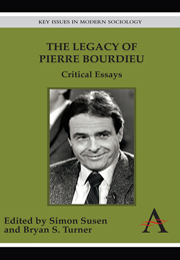Book contents
- Frontmatter
- Contents
- List of Contributors
- Introduction: Preliminary Reflections on the Legacy of Pierre Bourdieu
- 1 Between Structuralism and Theory of Practice: The Cultural Sociology of Pierre Bourdieu
- 2 Pierre Bourdieu: Unorthodox Marxist?
- 3 From Marx to Bourdieu: The Limits of the Structuralism of Practice
- 4 Durkheim and Bourdieu: The Common Plinth and its Cracks
- 5 With Weber Against Weber: In Conversation With Pierre Bourdieu
- 6 Bourdieu and Nietzsche: Taste as a Struggle
- 7 Elias and Bourdieu
- 8 Bourdieu and Adorno on the Transformation of Culture in Modern Society: Towards a Critical Theory of Cultural Production
- 9 The Grammar of an Ambivalence: On the Legacy of Pierre Bourdieu in the Critical Theory of Axel Honneth
- 10 Pierre Bourdieu and the Sociology of Religion
- 11 Bourdieu's Sociological Fiction: A Phenomenological Reading of Habitus
- 12 Overcoming Semiotic Structuralism: Language and Habitus in Bourdieu
- 13 Social Theory and Politics: Aron, Bourdieu and Passeron, and the Events of May 1968
- 14 Intellectual Critique and the Public Sphere: Between the Corporatism of the Universal and the Realpolitik of Reason
- 15 Practice as Temporalisation: Bourdieu and Economic Crisis
- Afterword: Concluding Reflections on the Legacy of Pierre Bourdieu
- Index of Names
- Index of Subjects
- Plate section
2 - Pierre Bourdieu: Unorthodox Marxist?
Published online by Cambridge University Press: 05 March 2012
- Frontmatter
- Contents
- List of Contributors
- Introduction: Preliminary Reflections on the Legacy of Pierre Bourdieu
- 1 Between Structuralism and Theory of Practice: The Cultural Sociology of Pierre Bourdieu
- 2 Pierre Bourdieu: Unorthodox Marxist?
- 3 From Marx to Bourdieu: The Limits of the Structuralism of Practice
- 4 Durkheim and Bourdieu: The Common Plinth and its Cracks
- 5 With Weber Against Weber: In Conversation With Pierre Bourdieu
- 6 Bourdieu and Nietzsche: Taste as a Struggle
- 7 Elias and Bourdieu
- 8 Bourdieu and Adorno on the Transformation of Culture in Modern Society: Towards a Critical Theory of Cultural Production
- 9 The Grammar of an Ambivalence: On the Legacy of Pierre Bourdieu in the Critical Theory of Axel Honneth
- 10 Pierre Bourdieu and the Sociology of Religion
- 11 Bourdieu's Sociological Fiction: A Phenomenological Reading of Habitus
- 12 Overcoming Semiotic Structuralism: Language and Habitus in Bourdieu
- 13 Social Theory and Politics: Aron, Bourdieu and Passeron, and the Events of May 1968
- 14 Intellectual Critique and the Public Sphere: Between the Corporatism of the Universal and the Realpolitik of Reason
- 15 Practice as Temporalisation: Bourdieu and Economic Crisis
- Afterword: Concluding Reflections on the Legacy of Pierre Bourdieu
- Index of Names
- Index of Subjects
- Plate section
Summary
Derek Robbins states categorically that ‘[t]here are no grounds for considering Bourdieu was ever a Marxist’ (2006: 513), whilst Brubaker argues that although Bourdieu might appear to be in the Marxist tradition, his critiques of Marxism should make us think otherwise (1985: 761). Although I shall be taking issue with both of these conclusions, I do not want to claim the opposite: that Marx alone influenced him. Bourdieu was unusually inventive in drawing also on Weber, Durkheim, Husserl, Mauss, Elias, and Pascal, not to mention others. Given more space, I would draw out all of these different strands in the texture of his work, whilst acknowledging that, at his best, his syntheses possess a masterly originality. Having rejected ‘histmat’ or Stalinist orthodoxy (Bourdieu, 1990: 3), however, it is my contention that Bourdieu is one of the great heirs of the Western Marxist tradition. It was not simply a youthful flash in the pan that led him to suggest his lycée students read The Communist Manifesto (Lescourret, 2008: 65–66).
My general proposal is this: a strong case can be made for the influence of Marx on Bourdieu's early writings. A more intricate case needs to be made for the view that Bourdieu continued to be influenced profoundly by Marx, despite the development of his distinctive language: the now-familiar concepts of habitus, field, doxa, allodoxia, and so on.
- Type
- Chapter
- Information
- The Legacy of Pierre BourdieuCritical Essays, pp. 33 - 58Publisher: Anthem PressPrint publication year: 2011
- 17
- Cited by



